《六年级英语复习课件》
合集下载
小学英语六年级总复习课件
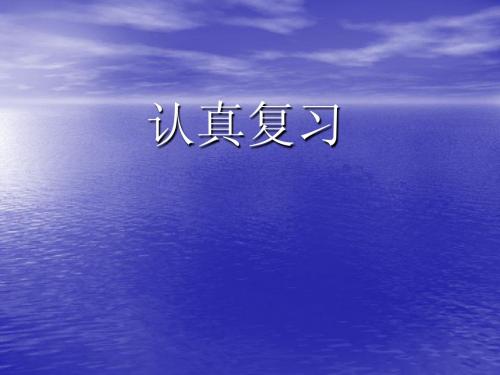
• 11、What’t in your box? 你的盒子里是什么? ——用于询问
盒子里有什么物品
别人的名字
Unit 4 Do you like peaches? 你喜欢桃吗? Yes, I do./ No, I don’t. 是的,我喜欢。/ 不,我不喜欢。 What about pears? 梨怎么样? I like them very much. 我非常喜欢它们。 3、 Let’s have some peaches and pears. 让我们买一些桃和梨吧。 4、 It tastes good. 它尝起来很好吃。 5、 Draw a peach. Colour it pink. 画一个桃子。把它涂成粉红色。 6、 Let me share with you. 让我和你一同分享吧! 7、 Sorry , I don’t like bananas. 对不起,我不喜欢香蕉。 8、 A: Can I have an apple,please? 请问我能吃一个苹果吗? Can I have a watermelon,please? 请问我能吃一个西瓜吗? Can I have some orange juice,,please? 请问我能喝一些橙汁吗? B: Certainly./ Sure. Here you are. 当然可以。/当然可以。给你。 9、 Have some more ? No , thank you. 再吃一些吧? 不,谢谢。 10、It’s cheap! 它很便宜! 11、I want some apples,bananas and oranges.我想要一些苹果、香蕉和橙子 12、I’m hungry./ I’m full. 我饿了。/ 我饱了。 13、Dog bag, please. No way! 请给我打包。 绝不可以。
人教PEP版英语六年级上册Unit 1 - Unit 3 复习课件
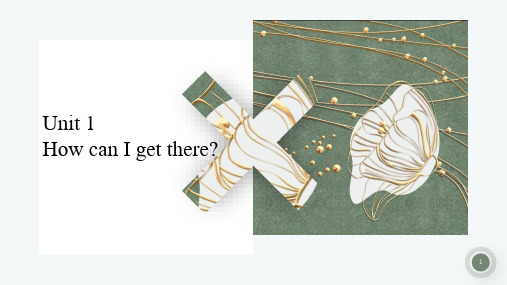
I go to park by bike. 我骑自行车去公园 2. take +a/an+交通工具+to+地点 表示”乘坐......去.....“ I take a bike to the park. 我骑自行车去公园
3.特殊: go to+地点+ on foot walk to +地点
I go to school on foot. = I walk to school.
提出建议的句型: Let's +动词原形+其他
Let's go to the nature park. 我们去自然公园吧。 我们去学校吧。 Let's go to school.
Let's=Let us 的缩写 Let 让 us 我们 we的宾格形式
情态 1. 情态动词+动词原形 动词
2.情态动词没有人称和数的变化
11
on foot 步行
by bus 乘公交汽车
by ship 乘轮船
by taxi 乘出租车
by plane 乘飞机
by train 乘火车
by subway 乘地铁
1、
1.问句: How do you come to/go to+地点名词? 询问对方来某地的交通方式
答语: I come to/go to +地点+表达出行方式的介词短语
a e i o u 元音字母开头且发元音的单词 冠词要用an
have a good time!玩的开心!
have to do(动词原形) 不得不去做
他不得不去学校。
he has to go to school.
3.特殊: go to+地点+ on foot walk to +地点
I go to school on foot. = I walk to school.
提出建议的句型: Let's +动词原形+其他
Let's go to the nature park. 我们去自然公园吧。 我们去学校吧。 Let's go to school.
Let's=Let us 的缩写 Let 让 us 我们 we的宾格形式
情态 1. 情态动词+动词原形 动词
2.情态动词没有人称和数的变化
11
on foot 步行
by bus 乘公交汽车
by ship 乘轮船
by taxi 乘出租车
by plane 乘飞机
by train 乘火车
by subway 乘地铁
1、
1.问句: How do you come to/go to+地点名词? 询问对方来某地的交通方式
答语: I come to/go to +地点+表达出行方式的介词短语
a e i o u 元音字母开头且发元音的单词 冠词要用an
have a good time!玩的开心!
have to do(动词原形) 不得不去做
他不得不去学校。
he has to go to school.
小学六年级英语复习课《祈使句》精品教学课件
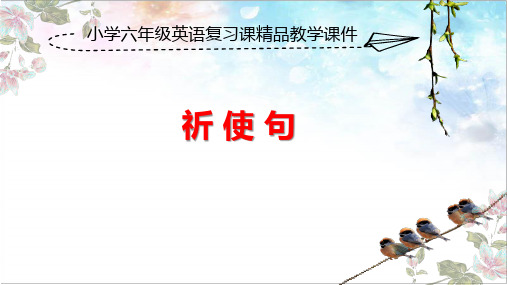
口诀: 使用祈使句,表示请求、命令或建议。 动词原形做开头,主语是you要省去。 句首Don't加动原,表示否定要注意。 Let's not加原形,也是一种否定句。 单词please表客气,句首句末没关系。
课堂练习:单项选择。
—____A____ help you.
—Thank you!
A.Let me
二、根据情景,选择正确的答案。
( )1.这里禁止吸烟,你应这样提醒大家:________
A.No parking!
B.No smoking!
C.No car!
( )2.在英语课上,老师对你说:________
A.Shout loudly, please. B.Read after me, please. C.Clean the room, please.
C.Go; turning
( )10.It's cold.________ the window, please.
A.Don't open
B.Don't cl要求完成下列句子。 1.You should keep the classroom clean.(改为祈使句) ________________________________________________________________________ 2.You can sit on the yellow chair.(改为祈使句) ________________________________________________________________________ 3.You must do your homework carefully.(改为祈使句) ________________________________________________________________________ 4.Take off your coat.(改为否定句) ________________________________________________________________________ 5.Water the flowers in the garden.(改为否定句) ________________________________________________________________________
小学六年级英语语法总复习PPT课件

.
• 小学阶段不规则动词全表
• Infinitive Past tense Infinitive
• 1. am, is
was
2. keep
• 3.are
were
5. make made
4.become
7. blow
blew
8. read
• 9. buy
bought
10. ride
• 11. catch caught
fly-flying walk-walking
jump-jumping sleep-sleeping
climb-climbing fight-fighting
swing-swinging drink-drinking catch-catching pick-picking
watch-watching play-playing
dance danced
变y为 i+ed
study studied
动词的过去式(不规则)
go-went read-read eat-ate sing-sang take-took buy-bought see-saw swim-swam am,is-was do-did are-were have-had get-got leave-left fly-flew stop-stopped(双写)
.
• 一般现在时的变化
1. be动词的变化。
否定句:主语+ be + not +其它。 如:He is not a worker.他不是工人 一般疑问句:Be +主语+其它。 如:-Are you a student? -Yes. I am. / No, I‘m not. 特殊疑问句:疑问词+一般疑问句。如:Where is my bike?
• 小学阶段不规则动词全表
• Infinitive Past tense Infinitive
• 1. am, is
was
2. keep
• 3.are
were
5. make made
4.become
7. blow
blew
8. read
• 9. buy
bought
10. ride
• 11. catch caught
fly-flying walk-walking
jump-jumping sleep-sleeping
climb-climbing fight-fighting
swing-swinging drink-drinking catch-catching pick-picking
watch-watching play-playing
dance danced
变y为 i+ed
study studied
动词的过去式(不规则)
go-went read-read eat-ate sing-sang take-took buy-bought see-saw swim-swam am,is-was do-did are-were have-had get-got leave-left fly-flew stop-stopped(双写)
.
• 一般现在时的变化
1. be动词的变化。
否定句:主语+ be + not +其它。 如:He is not a worker.他不是工人 一般疑问句:Be +主语+其它。 如:-Are you a student? -Yes. I am. / No, I‘m not. 特殊疑问句:疑问词+一般疑问句。如:Where is my bike?
小学六年级英语语法复习ppt课件

小学六年级英语
.
.
.
.
• 写出下列各词的复数 I _________him _________this ___________her ______ watch _______child _______photo ________diary ______
man______ woman_______ paper_______ juice___________ water________ milk________ rice__________ tea__________
.
• 2.行为动词:主语+行为动词(+其它)。如: We study English.我们学习英语。 当主语为第三人称单数(he, she,it)
时,要在动词后加"-s"或"-es"。如: Mary likes Chinese.玛丽喜欢汉语。
.
• 二、用括号内动词的适当形式填空。 1. He often ________(have) dinner at home. 2. Daniel and Tommy _______(be) in Class One. 3. We _______(not watch) TV on Monday. 4. Nick _______(not go) to the zoo on Sunday. 5. ______ they ________(like) the World Cup?
• 6, 用在序数词,方位词前和形容词最高级前, the first , the east, the tallest
.
• 3、零冠词(不用定冠词) (1)名词前已有作定语用的this, that, these, those, my, your, his, her, our, their, some等限 定词时,不用冠词。如:this eraser, her pencilbox, some boxes, those women等。 (2)泛指的不可数名词前一般不用冠词。如:meat, rice, water, bread, tea, milk, juice等。 (3)复数名词表示泛指时,不用冠词。如: the people in the room are doctors. 房间里的那 些人是医生。 (4)在表示学科的名词前一般不用冠词。如: Chinese, English, math, physics, history等。在 三餐饭和球类运动名词前一般不加冠词。如:have breakfast/ lunch/ supper, play basketball/ football等。 (5)在季节、节日、星期、月份前不用冠词。如: autumn, summer, winter, spring, Teachers’ day, Children’s day, Sunday, February等。 (6)在表颜色、语种和国家名词前不用冠词。如: white, brown, French, Australia等。 (7)在表示称呼语的名词之前,以及职务、头衔的 名词前不用冠词。如:Docto.r green is a scientist. 格林博士是位科学家。
.
.
.
.
• 写出下列各词的复数 I _________him _________this ___________her ______ watch _______child _______photo ________diary ______
man______ woman_______ paper_______ juice___________ water________ milk________ rice__________ tea__________
.
• 2.行为动词:主语+行为动词(+其它)。如: We study English.我们学习英语。 当主语为第三人称单数(he, she,it)
时,要在动词后加"-s"或"-es"。如: Mary likes Chinese.玛丽喜欢汉语。
.
• 二、用括号内动词的适当形式填空。 1. He often ________(have) dinner at home. 2. Daniel and Tommy _______(be) in Class One. 3. We _______(not watch) TV on Monday. 4. Nick _______(not go) to the zoo on Sunday. 5. ______ they ________(like) the World Cup?
• 6, 用在序数词,方位词前和形容词最高级前, the first , the east, the tallest
.
• 3、零冠词(不用定冠词) (1)名词前已有作定语用的this, that, these, those, my, your, his, her, our, their, some等限 定词时,不用冠词。如:this eraser, her pencilbox, some boxes, those women等。 (2)泛指的不可数名词前一般不用冠词。如:meat, rice, water, bread, tea, milk, juice等。 (3)复数名词表示泛指时,不用冠词。如: the people in the room are doctors. 房间里的那 些人是医生。 (4)在表示学科的名词前一般不用冠词。如: Chinese, English, math, physics, history等。在 三餐饭和球类运动名词前一般不加冠词。如:have breakfast/ lunch/ supper, play basketball/ football等。 (5)在季节、节日、星期、月份前不用冠词。如: autumn, summer, winter, spring, Teachers’ day, Children’s day, Sunday, February等。 (6)在表颜色、语种和国家名词前不用冠词。如: white, brown, French, Australia等。 (7)在表示称呼语的名词之前,以及职务、头衔的 名词前不用冠词。如:Docto.r green is a scientist. 格林博士是位科学家。
外研版(三起)英语六年级上册复习课ppt课件

(C)2. ______ there two doors in our classroom ?
A. Am B.Is C.Are
(C)3. There _________ some postcards on the desk
. A. am B.is C.are
( B) 4 . There _ _ _ _ _ _ _ not any milk in my bag .
7.Amy like watching TV. reading
go
likes
Reading and judging “True” or “False”:
I’m Helen. I’m from Changji, Xinjiang, China.
I’m an English
teacher in a primary1.schoo4l.. I like pop songs , reading , swimming , playing
A:What do you do B:We …
in Spring Festival on Lantern Festiva?l on Dragon Boat Festival
on Mid-Autumn Festival
D( )1.Tom
( )2.Daming
B( )3.Amy
A( )4.Sam
( )5.Lingling
A. a
B.some C. any
( B) 3 . There are _ _ _ _ postcards on the desk.
A. a
B. some C. any
( A) 4 . There is _ _ rice in the bag , but there aren’ t _ _ _
A. Am B.Is C.Are
(C)3. There _________ some postcards on the desk
. A. am B.is C.are
( B) 4 . There _ _ _ _ _ _ _ not any milk in my bag .
7.Amy like watching TV. reading
go
likes
Reading and judging “True” or “False”:
I’m Helen. I’m from Changji, Xinjiang, China.
I’m an English
teacher in a primary1.schoo4l.. I like pop songs , reading , swimming , playing
A:What do you do B:We …
in Spring Festival on Lantern Festiva?l on Dragon Boat Festival
on Mid-Autumn Festival
D( )1.Tom
( )2.Daming
B( )3.Amy
A( )4.Sam
( )5.Lingling
A. a
B.some C. any
( B) 3 . There are _ _ _ _ postcards on the desk.
A. a
B. some C. any
( A) 4 . There is _ _ rice in the bag , but there aren’ t _ _ _
人教版(PEP)六年级英语上册期末总复习课件
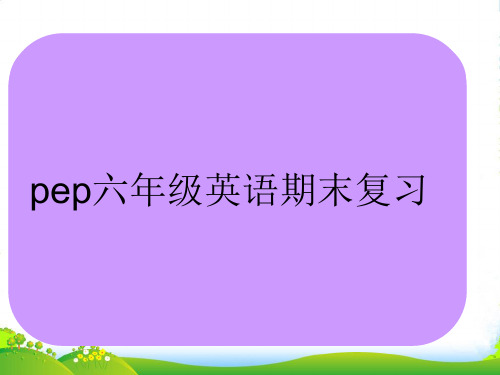
-----I’m going to be a science teacher one day. 我想将来有一天 当科学老师
1、What are you going to do?你想做什么?询问他人在未来的 打算。be going to 后面要跟动词的原形。注意be going to be 意思是 “打算成为什么,干什么职业。” 注意一下句子的区别,找出正确回答。 What are you going to do this afternoon? I am going to 加 做事的词组
pep六年级英语期末复习
重点词汇 science museum post office bookstore cinema hospital crossing turn left go straight turn right 重点句型 Where is the museum shop?
It’s near the door.
3 We’re going to draw some pictures in Renmin Park. 我们要到人民公园去画画。 4、 I’m going to see a film. 我打算去看电影。
5、 I’m going to visit my grandparents. 我打算去看望外 祖父母。
How are you going?I am going to 加交通方式的词组
Who are you going with? I am going to 加某人
部分疑问代词的意义与用法:
(1)What 什么。用来问是什么,做什么,叫什么,什么样等 等。如:What is your name? 你的名字叫什么? What is your father? 你爸爸是干什么的? What is your hobby?你的爱好是什么?What is your favourite food?你最喜爱的食物是什么? What’s your math teacher like? 你的数学老师长得什么样子? (2)Where , 在哪里,到哪里。用来问地点。
1、What are you going to do?你想做什么?询问他人在未来的 打算。be going to 后面要跟动词的原形。注意be going to be 意思是 “打算成为什么,干什么职业。” 注意一下句子的区别,找出正确回答。 What are you going to do this afternoon? I am going to 加 做事的词组
pep六年级英语期末复习
重点词汇 science museum post office bookstore cinema hospital crossing turn left go straight turn right 重点句型 Where is the museum shop?
It’s near the door.
3 We’re going to draw some pictures in Renmin Park. 我们要到人民公园去画画。 4、 I’m going to see a film. 我打算去看电影。
5、 I’m going to visit my grandparents. 我打算去看望外 祖父母。
How are you going?I am going to 加交通方式的词组
Who are you going with? I am going to 加某人
部分疑问代词的意义与用法:
(1)What 什么。用来问是什么,做什么,叫什么,什么样等 等。如:What is your name? 你的名字叫什么? What is your father? 你爸爸是干什么的? What is your hobby?你的爱好是什么?What is your favourite food?你最喜爱的食物是什么? What’s your math teacher like? 你的数学老师长得什么样子? (2)Where , 在哪里,到哪里。用来问地点。
PEP人教版小学英语六年级下册期末单元复习课件(全册)

注: 没有小尾巴
形代其后必须跟名词, 不能单独使用
1.相同点: 都表示XX的,有指代作用。
2.不同点: 用法不同
3.关联点: 名代=形代+物体
名代可以单独使用, 后面不接名词。
Your fish are bigger than mine.
Your fish are bigger .
Read and write 重点句子: 1.Wu Yifan and his family are going on a trip to the countryside. 2.Litter Duck is watching the sun go down. 3.It is getting lower and lower.
What size are your shoes?
什么码
1.I wear size +数字 shoes. 2.My shoes are size +数字.
省略形式: Size+数字
6.Your feet are bigger than mine.
foot-----feet(脚)
复数
mine=my feet
thinner
Tip:只有形容词才有比较级哦!
形容词
比较级
共同点: 都是形容词;词尾都有er。
younger
older
形容词比较级
注意: 至少有两者才能构成比较。 只有形容词才有比较级。
Sarah is younger.
参与比较的是Sarah 和Miss White.
完整形式 Sarah is younger than Miss White
Sarah is younger.
小学英语六年级毕业考试复习课件 专题六 交际用语 问路、指路(小声初)PPT课件
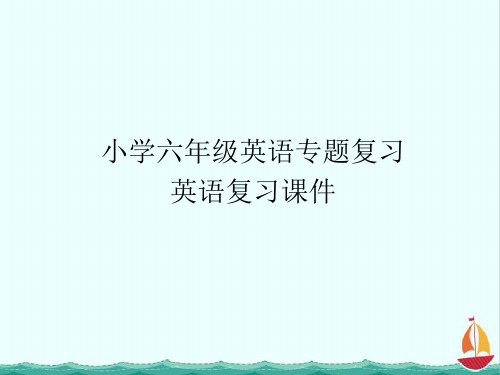
The entrance is on your left.
Read maps
Turn left when you come to the corner of the road
Cross the road
Walk along this road.
Cross the road . The entrance is in front
beside the bank / next to the bank on the left of the bank
Park
Post office
across from the park
Road signs
turn right
turn left
straight on
zebra crossing
You must wait.
行三分钟即到。 • Cross the street, walk on and take the second turning
on the right, it’s three minutes’ walk. • 非常谢谢。 • Thanks a lot. • 不用谢。 • Not at all.
Summarization
You can cross the road.
at traffic lights
crossroads
• Is this the way to…?
• Where is…?
• How can / do I get to …?
• Can / could you tell me the way to …?
6.斑马线 7.在你的左边
zebra crossing on your left
小学六年级英语复习课《陈述句》精品教学课件
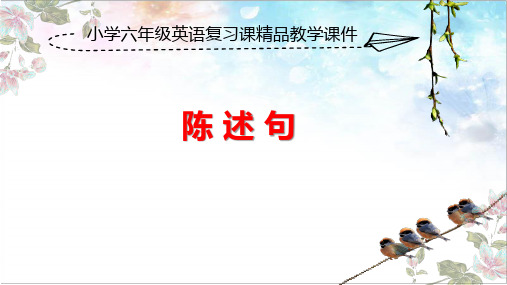
点评: 第1题句中有be动词,改写否定句时要在be动词后加not,are not 可以缩写为aren't。 第2题由题干可知,句子中没有be动词和情态动词,因此变否定句 时,必须要加助动词don't或doesn't;主语he是第三人称单数,因 此只能用doesn't,其后接动词原形,即does要还原为do。注意千 万不要在原题中的does后面直接加not,因为这里的does是实义动 词“做”,不是助动词。
6.音乐使她健康快乐。 Music ________ her ________ and happy. 7.她英语说得非常好。 She ________ English very ________. 8.我的爸爸正在书房里写信。 My father ________ ________ a letter in the study. 9.这周末我不能和你一起去游泳了。 I ________ ________ swimming with you this weekend. 10.吉姆昨天和我一起踢足球了。 Jim ________ ________ with me yesterday.
否定句主要是在肯定句的基础上加了否定词“not”。 有动词be的句子则“not”加在be的后面,可缩写成isn't(wasn't)或 aren't(weren't)。但am not一般都分开写。 没有be动词的句子则要先在主要动词的前面加上一个助动词(do, does,did),然后在它后面加上“not”,也可以把它们缩写成 “don't,doesn't,didn't”,这三个助动词要根据人称和时态来选择, 其中“does”只用于一般现在时且主语是第三人称单数的情况,而 did只用于一般过去式,不论主语是什么人称和数,都用did。
小学六年级英语复习课《动词:实义动词(行为动词)》精品教学课件
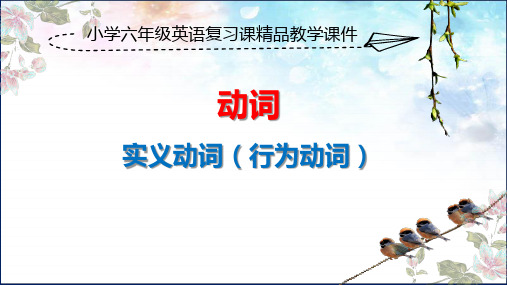
8. wash ________
9. clean ________
10.pass ________
11. play ________
12. put ________
பைடு நூலகம்
(二) 写出下列动词的现在分词形式。 1.swim ________ 2.die ________ 3.fly ________ 4.see ________ 5.write ________ 6.sing ________ 7.say ________ 8.run ________ e ________ 10.jump ________ 11.ski ________ 12.talk ________
1.及物动词必须带宾语,表示动作的对象。如: I like music.我喜欢音乐。
2.不及物动词不能直接跟宾语或不需要带宾语。如: Birds can fly.鸟会飞。
3.大多数实义动词既可作及物动词,又可作不及物动词。如: He speaks Chinese well.他汉语说得很好。(speak作及物动词) He speaks too fast.他说得太快。(speak作不及物动词)
5.他常常在学习上帮助我。 He usually ________ me with my lessons.
6.我通常在晚上六点钟吃晚饭。 I usually ________ ________ at 6 o'clock in the evening.
感谢聆听
三、用括号内所给单词的适当形式填空。 1.The boys ________ (play) football now. 2.He usually ________ (have) lunch at school.But yesterday he ________ (have) lunch at home. 3.Lucy ________ (like) bananas very much. 4.Look! She ________ (dance) in the classroom. 5.Do you like ________ (take) photos? 6.Lily is good at ________ (sing). 7.Nick ________ (not go) to the zoo last Sunday. 8.We ________ (not watch) TV on Mondays. 9.What ________ they ________ (do) next Saturday? 10.Tina and I ________ (take) a walk yesterday evening.
湘少版小学英语六年级上册期末复习课件(1)

bring
meet
peanut
fruit
candy
一、用括号内所给动词的正确情势填空
• 1. My grandpa always _g_e_ts_ up early.(get) • 2. Can you c_o_m__e to my party now?(come) • 3. What _d_id_ you _d_o_ last weekend?(do) • 4. I v_i_s_it_e_d_my grandparents last XXXday. (visit) • 5. My father b_o_u_g_h_t__ me a phone on the Mid-
a computer.
A. his B. him C. her
(A)19. Dino stood up, but
sit down.
A. did not B. is not C. do not
(B)20. My brother is very naughty, but he sometimes
___ ___________ before dinner.
三、选出不同类的单词。(10分) (B )11. A. four B. eighth C. seven (C)12. A. writing B. reading C. interesting (B )13. A. played B. learn C. went (B )14. A. was B . did C. were ( B )15. A. computer B. talk C. newspaper
Autumn Festival. (buy)
• 6. It _w_a_s_n_o_t__ Saturday yesterday.(be not) • 7. She _d_o_e_s_n_'t_li_k_e__ apples.(not like) • 8. We _d_i_d_n_'t_s_t_a_y__ at home during the
小学六年级英语复习课《感叹句》精品教学课件
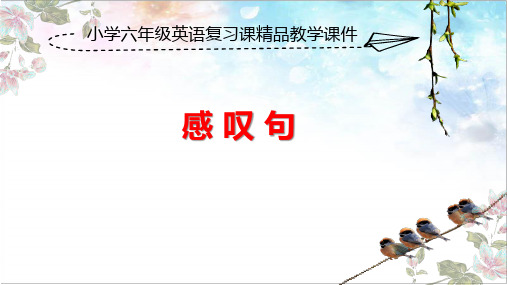
A.How
B.What a
( )5.—Look at the students.
—________ excited (兴奋的)!
A.What a
B.What an
C.How a C.What a
C.You're C.What
C.How
( )6.________ fast the car is running!
________ ________ food! 5.The news is sad.(改为感叹句) ________ sad the news ________! 6.How beautiful the city is!(改为同义句)
________ a ________ city it is! 7.How dirty the bedroom is!(改为同义句)
四、按要求完成下列句子。 1.It's a lovely dog.(改为感叹句)
________ ________ lovely dog it is! 2.They are magic clothes.(改为感叹句)
________ ________ clothes they are! 3.The film is very interesting.(改为感叹句) ________ interesting the film ________! 4.The food is yummy.(改为感叹句)
课堂过关训练:
一、用What或How填空。 1.________ a good boy! 2.________ beautiful pictures they are! 3.________ happy the children are! 4.________ boring the film is! 5.________ bad rice it is! 6.________ time flies! 7.________ well the boys are singing! 8.________ a cheap skirt it is! 9.________ hard the work is! 10.________ hard work it is!
译林版(三起)英语六年级上册 Unit 2 复习课件PPT
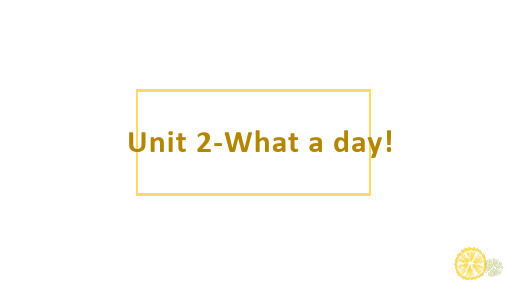
Story time
• We brought some dumplings,some bread and honey and some drinks.
• 我们带了一些饺子、面包、蜂蜜和一些饮料。 • bring-brough • bread以及honey不可数
Story time
• We saw some ants on the bread and honey. • 我们在面包和蜂蜜上看到了一些蚂蚁 • see-saw • There were some bees too. • 也有一些蜜蜂 • are-were
Words
• lose丢失 • 过去式lost • I lost some money. • 我丢了一些钱。 • know知道 • I know.我知道 • I do not know. • 我不知道
Words
• What happened? • 发生了什么? • What’s up?怎么了? • What’s wrong ? • =What’s wrong with you? • 你怎么了?
Unit 2-What a day!
Words
• sunny晴朗的 • windy有风的 • cloudy多云的 • rainy有雨的 • sun 太阳(独一无二) • wind风(不可数) • cloud云(可数) • rain雨(不可数) • There was heavy rain yesterday . • 昨天下了大雨
• Then,the weather became windy and cloudy. • We flew kites high in the sky. • 然后,天气变得多风多云。 • 我们在高空中放风筝。 • become-became • fly-flew
六年级英语上学期Unit12复习课件译林版三起

4. It rained yesterday. (改为一般疑问句) ____D_i_d____ it ____r_ai_n____ yesterday?
错题再现
一、单项选择。 ( B )1. -- _____ nice clothes! -- Thank you.
A. How B. What C. What a
7. take many photos 拍了许多照片
14. 发生什么事了?What happened?
Learning Objectives
Sound & Culture Time 语音和文化时间 Grammar 语法 + 错题练习 阶段性测评
Part1 Sound & Culture Time
二、Culture time & Song time 文化时间 & 歌曲时间 1. This is an American cowboy. He’s wearing jeans.
这是一个美国牛仔。他穿牛仔裤。 This is a Scottish man. He’s wearing a kilt. 这是一个苏格兰人。他穿苏格兰短方格裙。 2. Rain, rain, go away. Come again another day. Little John wants to play. Rain, rain, go away.
主系表句型改写
I was a student ten years ago.
否定句: I wasn’t a student ten years ago . 一般疑问句:Were you a student ten years ago?.
做题秘籍: 一找: 动词(情/助/be动词)+not. 二变: some/and/too/第一人称/句号.
错题再现
一、单项选择。 ( B )1. -- _____ nice clothes! -- Thank you.
A. How B. What C. What a
7. take many photos 拍了许多照片
14. 发生什么事了?What happened?
Learning Objectives
Sound & Culture Time 语音和文化时间 Grammar 语法 + 错题练习 阶段性测评
Part1 Sound & Culture Time
二、Culture time & Song time 文化时间 & 歌曲时间 1. This is an American cowboy. He’s wearing jeans.
这是一个美国牛仔。他穿牛仔裤。 This is a Scottish man. He’s wearing a kilt. 这是一个苏格兰人。他穿苏格兰短方格裙。 2. Rain, rain, go away. Come again another day. Little John wants to play. Rain, rain, go away.
主系表句型改写
I was a student ten years ago.
否定句: I wasn’t a student ten years ago . 一般疑问句:Were you a student ten years ago?.
做题秘籍: 一找: 动词(情/助/be动词)+not. 二变: some/and/too/第一人称/句号.
相关主题
